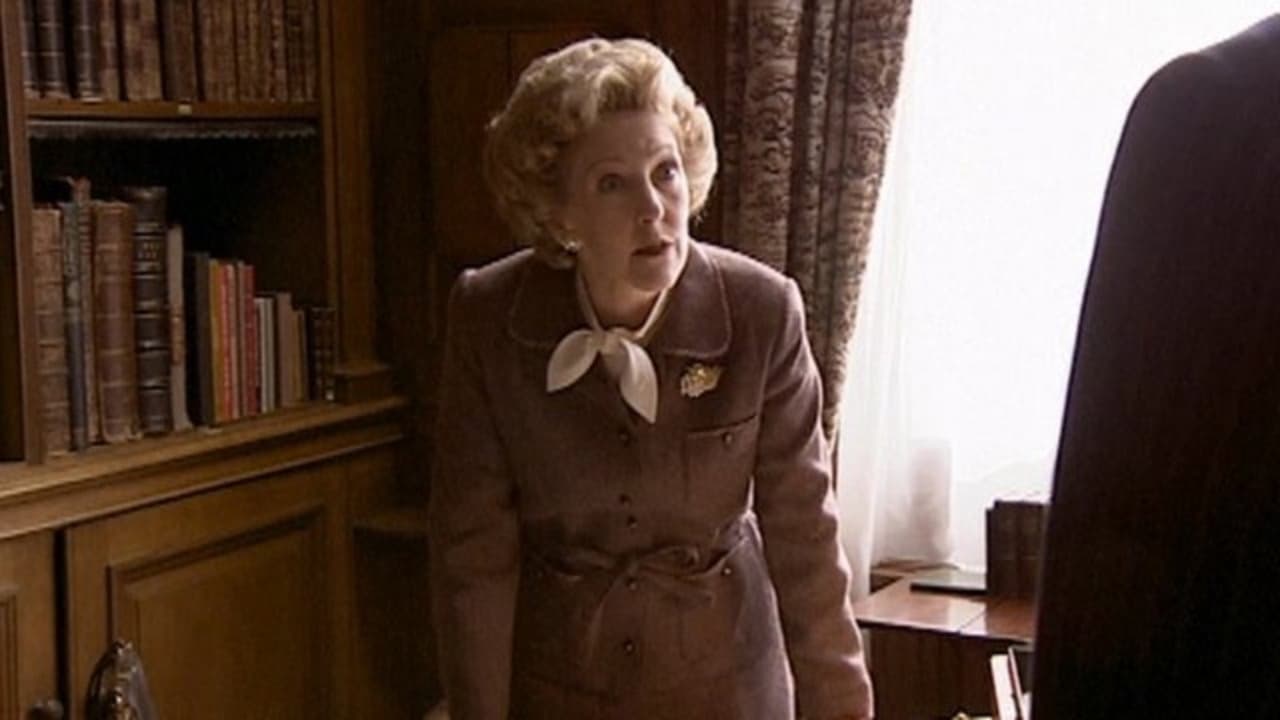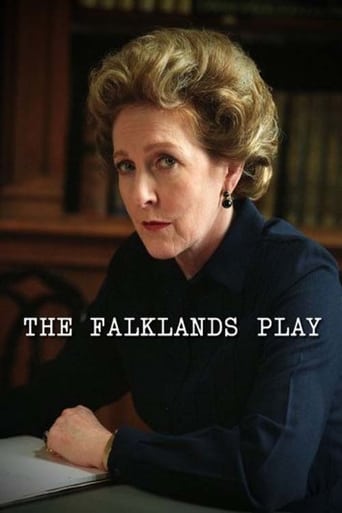StunnaKrypto
Self-important, over-dramatic, uninspired.
Chirphymium
It's entirely possible that sending the audience out feeling lousy was intentional
Sienna-Rose Mclaughlin
The movie really just wants to entertain people.
Hattie
I didn’t really have many expectations going into the movie (good or bad), but I actually really enjoyed it. I really liked the characters and the banter between them.
mark-sheriff
To state that this is a 'political drama', would fail to transfer an understanding of the feast of entertainment, excitement (even though we know the conclusion), and insight, into how the 'powers' interact, during an escalation to war.The acting is of the highest order...... you truly believe that these are the people, and this is how they behaved (Hodges Thatcher is remarkable). Add this to a plot that fiction could never match, and you are likely to be hooked from the opening scene.With caution, I would also suggest that this drama does bring history to the viewer, in a way the BBC seems to constantly excel at. Much of the script is taken from hansard (parliamentary transcripts), contemporary diaries, and news reports..... the drama didn't need to be invented.One or two earlier reviewers felt that it was a historical distortion, however, in my opinion, they are still grinding axes.So yes.... do bear in mind that in the years running up to the crisis, perhaps the Brits took their eye off the Falklands (though this is outside the remit of this play).Also yes.... there was the major incident 'sinking of the Belgrano', that in real life, was controversial. However, I believe the play portrayed the genuine view of the decision makers: 'destroy it, before it destroys us'.... a view held by the majority of the UK population (I would suggest).As for the suggestion that 'Thatcher would never have ranted against Argentina to the US', I find beyond belief. That's exactly how she behaved, and she was famous for it AND by the way, it is portrayed marvelously in this play, with the joy of historical posturing so well done.If you get the chance...... watch it!
Matthew Kresal
Detailing how the government of UK Prime Minister Margaret Thatcher dealt with the Falkland Islands War of 1982, The Falklands Play has a long history. One of the most controversial productions ever commissioned by the BBC, The Falklands Play was unproduced for nearly two decades when it was finally aired on BBC Four in 2002. Originally unproduced due to being deemed to be too pro-Thatcher and jingoistic in its tone, The Falklands Play is an intriguing example of historical drama and the controversy it can cause.The film certainly has a fine cast. Patricia Hodge excels as Thatcher or at the very least playing the Thatcher portrayed in the script. Hodge's Thatcher is a strong willed woman who refuses to back down under any circumstances. The supporting cast includes strong performances from James Fox as Foreign Secretary Lord Peter Carrington, Clive Merrison as Defence Minister John Nott, Colin Stinton as US Secretary of State Alexander Haig, John Woodvine as Admiral Sir Terence Lewin and Tom Chadbon as Admiral Sir John Fieldhouse. Each of their performances, and those of much of the rest of the cast, gives the film a strength that it needs.The production values of The Falklands Play are strong as well. Melanie Allen's production design captures the real life settings of the film including an excellently done set of the House of Commons. The film's cinematography is exceptional as well with its cinema verite approach. The result is that the film is given a strong documentary feel to the entire film, giving the viewer the sense of watching history unfolding before them. The film also makes strong use of documentary footage from the time as well, mixing it skillfully into the drama. Like the performances, these elements give the film a strength that it needs.The script by Ian Curteis is at the heart of the film. The script after all was the single most controversial aspect of the production for almost twenty years. Back in the 1980s, the BBC deemed the script to be too pro-Thatcher and jingoistic in its tone. Looking at the film itself, it is very easy to see how that came about. The strong willed portrayal of Thatcher and her handling of her the situation is certainly pro-Thatcher. Also the film's portrayal of the decisions leading to the sinking of the Argentinian warship the General Belgrano, one of the most controversial events of the war, can certainly be seen to be pro-Thatcher. Surprisingly, the script used in the film isn't even the one originally written in the 1980s as it removes all the scenes involving the Argentinian Junta and the Pope. One suspects that the reaction the film would have gotten in the 1980s when it was supposed to have aired would have been similar to the reception that the 2003 Showtime film DC 9/11: Time Of Crisis (a film about President George W. Bush's handling of the 9/11 attacks and the lead up to the invasion of Afghanistan) received when it aired: being seen overwhelmingly as a piece of propaganda. The Falklands Play definitely isn't that but it is all too easy to see how it could have been seen as such.The Falklands Play is an interesting film. It has strong performances from its entire cast and also features strong productions values especially with its cinematography. The script however is the film's most interesting point as it was the source of controversy that kept the film from originally being made to begin with. With hindsight, it is easy to see why the script proved so controversial at the time and why it could remain so today. The Falklands Play therefore is an interesting film about a controversial war and a intriguing piece of historical drama.
jonah-1
In this day and age of cynicism it's refreshing for a film (tele-play?) to tell it how it was. At the end of the day a militaristic dictatorship invaded a peaceful little Island, watched over by a democratic nation. Sorry but those are the facts. This is how it's told. You then throw in a strong, charismatic leader and you've also got a damn good story. Patricia Hodge (I would never have cast her) was marvellous. Anyone wishing to see a balanced view of the conflict should watch this and An Ungentlemanly Act and this presentation.
jgb3
The Falklands Play has got to be one of the most controversial plays never produced of the 1980s.Originally written by Ian Curteis shortly after the war ended but the BBC declined to produce it, officially because it wasn't good enough, but widely believed to be because it was too pro-Conservative just before a General Election in the UK. Watching it now it's even harder to believe that it wasn't good enough to make years ago.Telling the story of the British politics immediately before and during the conflict Patricia Hodge is brilliant in her role as Mrs. Thatcher. So scarily like her that during the recreated news clips it's hard to remember which one is the actress. Although some of the other lead characters look and sound nothing like their alter-egos, they still manage to recreate the right atmosphere.Deliberately supposed to show the conflict from `our side' I'm not sure if the emotional side of Margaret Thatcher isn't over played slightly.

